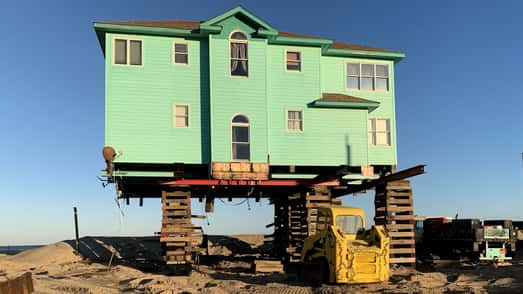Erosion of Rodanthe Beach’s coastline is higher than other beaches in the region, endangering property and the safety of residents.
By Richard Perrins
Published Jun 14, 2023 2:13 PM PDT | Updated Jun 14, 2023 2:13 PM PDT
Shane Bouie and his family just wanted a unique family getaway. But their rental home in Rodanthe Beach swayed as wave after wave crashed under the stilted house, though specialists reassured them it was stable.
“They said everything was doubled up as far as stability,” Bouie told AccuWeather’s Jillian Angeline. “They added secondary posts and they said about a month ago or so the engineers looked it over.”
Last year, four oceanfront homes collapsed into the ocean in Rodanthe, part of the Outer Banks in North Carolina. On March 13, a one-story home just steps away from Bouie’s rental house collapsed into the ocean. Officials warn that more houses will keep crumbling into the Atlantic as erosion continues along the Outer Banks’ coastline.
While an eroding coastline is inevitable, the rate of erosion along the state’s coast is alarmingly high. Michael Flynn, a physical scientist for the Cape Hatteras National Seashore, said the average annual rate of erosion between 1998 and 2022 ranged from 9 to 12 feet in areas of Rodanthe Beach. In Buxton, a shoreline that was eroding quickly but was recently renourished, the erosion rate was nearly 7 feet per year on average.
According to the Outer Banks’ Visitors Bureau, renourishment involves pumping sand from offshore sites or sandbars onto the shoreline to protect areas from the effects of significant erosion and prevent property damage in those areas. While authorities completed the renourishment of about 3 miles of the Buxton shoreline in August 2022, the Outer Banks did not have scheduled plans for the renourishment of Rodanthe Beach as of June.
Chris Willis, a resident who grew up in the Outer Banks, said he would like to see renourishment efforts expanded for the weathered beaches.
“It’s just so different, seeing it from when I was a kid and seeing it now,” Willis said. “There’s definitely more erosion.”
Bobby Outten, Dare County manager, said the county is working to get federal funding to build up the vulnerable Rodanthe beaches. In January, Outten and the county hosted a public meeting to provide information and discuss residents’ concerns about erosion and the dangers it poses.
Have the app? Unlock AccuWeather Alerts™ with Premium+
The eroding beaches also uncover debris in shallow waters, Outten said, and the high winds in recent weeks have left the debris even more exposed. As the surf comes in for high tide, the debris is hidden, posing a danger to residents. The beaches are National Park Service property, so it enforces debris removal, Outten said.
“We’re there to support them. They’re working really hard, actively enforcing, and spent piles of money and lots of time doing that,” he said.
Less than 2 miles away from Bouie’s rental house, families are still soaking up the sunshine, aware that the beachfront structures that many residents call home are in danger of collapsing.
“It’s part of the Earth. Things happen,” one resident said. “When you build this close to the ocean, it’s gonna happen.”

For the homeowner, it’s an expensive endeavor. Insurance doesn’t cover the cost. The contractor says it costs $60,000 just to move one home, and the price, just like the sea, is rising.
AccuWeather National Reporter Jillian Angeline contributed.
READ MORE HERE:
Want next-level safety, ad-free? Unlock advanced, hyperlocal severe weather alerts when you subscribe to Premium+ on the AccuWeather app. AccuWeather Alerts™ are prompted by our expert meteorologists who monitor and analyze dangerous weather risks 24/7 to keep you and your family safer.




No comments:
Post a Comment